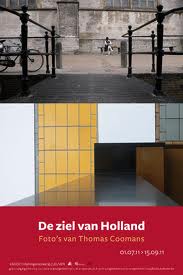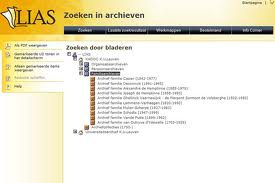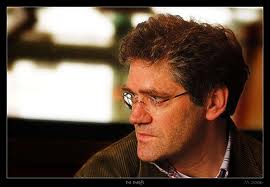Introduction
It has already been one year since the first E-newsletter of Evadoc was published (in Dutch). Since then, many ˗ at home and abroad ˗ have found the (electronic) way to Evadoc. By means of this biannual newsletter we want to stay in contact with you and to inform you about numerous matters regarding Evadoc and its activities.Regional Study Evenings
This autumn, Evadoc management will organize provincial training evenings for the conservation and management of archives in cooperation with KADOC. These training evenings are oriented to everyone who is engaged in the secretarial work and the management of their own archive in church/communities-, non-profit organizations or Protestant-Evangelical associations. The aim of these evenings is to introduce the basic principles of the conservation of archives in a concrete, usable and understandable way. In each province, one evening will be organized, so that everyone has the possibility to attend the training within reasonable distance. The dates are: Tuesday 20 September 2011 in Ichtegem (West-Flanders) Friday 14 October 2011 in Ghent (East-Flanders) Monday 24 October 2011 in Genk (Limburg) Tuesday 16 November 2011 in Deurne (Antwerp) Monday 29 November 2011 in Zaventem (Flemish-Brabant) Tuesday 6 December 2011 in Berchem (Antwerp). This evening, the training will be in English and is specifically oriented to immigrant churches. The leaflet with the programme, addresses and route description can be found on our website. You can register online or in writing..Do you want to share these dates and the link to the leaflet with other interested parties? For example, with (local) Protestant-Evangelical non-profit organizations for the benefit of mission, church social welfare work, music, etc. We would really appreciate that.
We intend to provide this training in French in the future. We will inform you in due time via this newsletter about when and where these will be given.Exhibitions
We would like to draw your attention to the gripping photo-exhibition De ziel van Holland (The soul of Holland). Which influence does the landscape have on our religious perception? Has the Calvinistic abstraction reformed the Dutch landscape or has the abstract harmony determined the faith of the people? Thomas Coomans, lecturer in history of architecture and conservation of monuments at the K.U. Leuven, presents in the cloisters of KADOC a moving series of photographs on the soul of the Dutch country. The exhibition De ziel van Holland, foto’s van Thomas Coomans is free of charge and runs from the 1st of July until the 17th of September in the cloisters of KADOC in Leuven.
This image gives you a foretaste. The photos were printed in Stimulerende ambiguïteit: Ogen-blikken op de Ziel van Holland, published by Philip Elchers. For practical information about the exhibition you can go to the KADOC-website. For the book we refer you to http://www.philipelchers.nl.
Which influence does the landscape have on our religious perception? Has the Calvinistic abstraction reformed the Dutch landscape or has the abstract harmony determined the faith of the people? Thomas Coomans, lecturer in history of architecture and conservation of monuments at the K.U. Leuven, presents in the cloisters of KADOC a moving series of photographs on the soul of the Dutch country. The exhibition De ziel van Holland, foto’s van Thomas Coomans is free of charge and runs from the 1st of July until the 17th of September in the cloisters of KADOC in Leuven.
This image gives you a foretaste. The photos were printed in Stimulerende ambiguïteit: Ogen-blikken op de Ziel van Holland, published by Philip Elchers. For practical information about the exhibition you can go to the KADOC-website. For the book we refer you to http://www.philipelchers.nl.
Protestantism
Looking toward the future we have already begun, in cooperation with KADOC, the first preparations for an exhibition of Protestantism in 2015. As the above exhibition, this one will be held in the cloisters of KADOC in Leuven.French-speaking Belgium
After the French version of the website, the French leaflet will follow after the summer. That is also the signal to become more active in French-speaking BelgiumAcquisitions
From the Vrije Evangelische Gemeente in Koekelare we received an eighteenth-century Dutch Authorized Version of the Bible (Statenvertaling). This Bible fits in the Evadoc collection for various reasons. For example, southern Dutch Protestants participated in the creation of this translation. In addition, the Dutch Authorized Version was the standard Bible in Protestant-Evangelical congregations. There are also four recently written books by Agnes Laurey from the Kempische Volle Evangelie Gemeente Rehoboth. This church also donated our documentation centre two CDs which they produced. Finally, I want to mention the book Belgisch Protestantisme in Perspectief by Guy Liagre, that publishing company Houtekiet have donated to us.LIAS
 Because of the growing digitalization in our society, more and more digital files are arriving at Evadoc (text files, e-mails, photos, websites, etc). Like the classic paper format these have to be selected, described and durably preserved in accordance with archiving principles. Besides that, they have to be made accessible for use. Thanks to the cooperation with KADOC, Evadoc can use LIAS, an archive management system and adjoining digital repository, developed by the K.U. Leuven. The system was presented to the public on the 22nd of October. You can find an extensive description of LIAS in the KADOC-newsletter. Using LIAS, you can access the descriptions of the archives online which are located at Evadoc, of Operation Mobilization Belgium, Joni and Friends Europe and the Flemish Bible society. The other archives will follow as soon as they are processed.
Because of the growing digitalization in our society, more and more digital files are arriving at Evadoc (text files, e-mails, photos, websites, etc). Like the classic paper format these have to be selected, described and durably preserved in accordance with archiving principles. Besides that, they have to be made accessible for use. Thanks to the cooperation with KADOC, Evadoc can use LIAS, an archive management system and adjoining digital repository, developed by the K.U. Leuven. The system was presented to the public on the 22nd of October. You can find an extensive description of LIAS in the KADOC-newsletter. Using LIAS, you can access the descriptions of the archives online which are located at Evadoc, of Operation Mobilization Belgium, Joni and Friends Europe and the Flemish Bible society. The other archives will follow as soon as they are processed.
Commitee of Recommendation
In Flanders, George Harinck is probably not well-known. He is the president of the Historisch Documentatiecentrum voor het Nederlands Protestantisme (1800-heden) (HDC) of the Free University in Amsterdam and of the Archief- en Documentatiecentrum (ADC) of the Reformed Churches (Vrijgemaakt) in the Netherlands. He is also the affiliate professor of history at the Theological University Kampen (Broederweg) and professor of collection development and history of neo-Calvinism in the faculties Theology and Literature at the Free University in Amsterdam. Harinck has been involved in the Association of Christian historians (VCH) since its formation in 1989 and directed this association as chairman for several years. In November 2005 the Christelijke Encyclopedie (3e print) edited by George Harinck was published by Kok.
Protestantisme (1800-heden) (HDC) of the Free University in Amsterdam and of the Archief- en Documentatiecentrum (ADC) of the Reformed Churches (Vrijgemaakt) in the Netherlands. He is also the affiliate professor of history at the Theological University Kampen (Broederweg) and professor of collection development and history of neo-Calvinism in the faculties Theology and Literature at the Free University in Amsterdam. Harinck has been involved in the Association of Christian historians (VCH) since its formation in 1989 and directed this association as chairman for several years. In November 2005 the Christelijke Encyclopedie (3e print) edited by George Harinck was published by Kok.
The reason why I recommend
Dutch Protestantism is not on an island. Through the ages there was contact with Puritans and Evangelicals in England and Scotland, the Erskines and Alister McGrath. In the east we find Germany, the country with the great Protestant theologians Karl Barth and Dietrich Bonhoeffer. From Denmark we know Kierkegaard and Kaj Munk. But in the south, contacts behind Breda seem to cease and the influence from Belgium appears to be blocked off. Similar to how the Roman Catholic Church was not officially present in the northern provinces from the 16th century until 1853, she only could maintain a Dutch mission, our view of Protestantism Belgium seems uncharted. Nevertheless, Protestants and Protestant communities also existed in Belgium. Dutch Protestant communities have founded congregations and have viewed Belgium as the closest at hand missionary area since 1830. The question if that was right and if this does not show the Dutch feeling of superiority towards Flanders is still under discussion. Fact is that known Protestants like A. van Schelven, V. Hepp and J.H. Scheps tried to spread the light of the gospel in ‘dark Belgium’. But whatever Dutch influence was exerted on Belgian Protestantism and how much it was nourished from the Netherlands, Protestantism has remained typical Belgian, for the simple reason that Amsterdam is not Brussels and Kampen is not Heverlee. Our southern neighbours were more relaxed and life in the city was less serious in Belgium ˗ I have never heard that Kuyper was seen in his birthday suit in front of a window frame in Amsterdam; but he was seen in the nude in Brussel ˗ and Protestant religious life was not defined by Dutch structures. Protestantism has always had different confessions, dependent on different countries and areas. Because of this, it is a good sign that Belgian Protestantism preserves and manages its own history in Evadoc now. Archive management is always a mark of self-respect. The Dutch people probably have to learn that Protestantism in Belgium is independent and vital, which is shown by the existence of Evadoc. Let us intensify the Protestant dialog with Belgium, like with England, Germany and Denmark. Dutch interest for and support in Evadoc could be a good start. George HarinckPresident HDC en ADC